Why Hydration Matters for SAT Success
When most students think about SAT prep, they picture practice tests, vocab flashcards, and timed reading passages. Few imagine a water bottle as a secret study weapon. Yet hydration affects attention, working memory, reaction time, and mood — all of which matter on a long, high-stakes test day. Your brain is roughly 73% water; when its fluid balance shifts, even by a small amount, mental performance can dip.
This isn’t motivational fluff. Researchers and clinicians consistently show that mild dehydration (as little as 1–2% of body weight) can reduce concentration, increase fatigue, and slow down processing speed. For students squeezing in evening practice, early-morning study sessions, or marathon full-length tests, a steady approach to fluids can help keep the edge you’re working hard for.
The science in plain English
Think of your brain as an engine that runs on electrical signals inside a well-lubricated environment. Water helps:
- Maintain neurotransmitter balance and efficient electrical activity.
- Support blood flow to the brain, carrying oxygen and nutrients.
- Regulate body temperature so you don’t feel sluggish from overheating.
- Keep your eyes and mouth comfortable so reading and writing are easier.
When these systems are working smoothly, the normal cognitive tasks required on the SAT — parsing complex passages, holding multiple facts in working memory, solving multi-step problems — feel easier. When they’re not, you may notice slower thinking, fuzzy recall, or sudden irritability during a long practice test.
Recognize the warning signs: are you dehydrated?
Dehydration doesn’t always look dramatic. It creeps in. Here are subtle clues to watch for, especially during heavy study days or long practice exams:
- Dry or sticky mouth and a persistent thirst.
- Less frequent trips to the bathroom and darker urine color.
- Headache, lightheadedness, or neck tension during review sessions.
- Difficulty concentrating or frequent mental blanks on problems you usually solve.
- Sudden fatigue after a period of focused work.
These signs are your body’s way of telling you to refill the tank. The quicker you respond, the faster your brain can recover its usual clarity.
How much water should you drink while preparing?
There isn’t a one-size-fits-all number, because fluid needs vary by body size, activity level, climate, and diet. Instead of rigid rules, aim for a practical baseline and adjust. For most teens preparing for the SAT, a good starting point is:
- About 6–10 cups (48–80 ounces, or 1.4–2.4 liters) of total fluids per day, from water, drinks, and food. This is a baseline, not an upper limit.
- Increase that amount if you’re exercising, studying in a hot room, or sweating more than usual.
A simple daily hydration plan for busy students
Below is a practical hydration schedule that fits around class, study time, and practice tests. It’s easy to tweak: smaller people may need less, and highly active students may need more.
| Time | What to drink | Why it helps | Approx. volume |
|---|---|---|---|
| Upon waking | Room-temperature water (glass or 8–12 oz bottle) | Replenishes overnight fluid loss and gently wakes up your system | 8–12 oz |
| Before morning study session | Water or lightly flavored water | Keeps focus steady for reading and math practice | 8 oz |
| Mid-morning break | Water or a small glass of milk / tea (low-caffeine) | Refuels without sugar spikes | 6–8 oz |
| Lunch | Water + hydrating foods (salad, fruit, yogurt) | Food contributes to hydration and steady energy | 12–16 oz total fluids |
| Afternoon study or practice test | Water bottle at hand; small sips between sections | Prevents attention lapses during longer sessions | 8–16 oz over 2–3 hours |
| Evening review | Water, herbal tea, or milk | Hydrates without disrupting sleep (avoid caffeine) | 8 oz |
These are cumulative targets. The goal is steady intake, not downing water all at once. Frequent small sips are friendlier to your stomach and attention span than gulping huge amounts between practice sections.
Best drinks and snacks to keep you sharp
Not all fluids are equal for sustained cognitive performance. Here’s a handy comparison to help you choose quickly when you’re mid-study or packing for a practice SAT.
| Drink | Hydration effectiveness | Caffeine / sugar | When to use |
|---|---|---|---|
| Plain water | Excellent | None | All day; best baseline choice |
| Flavored or infused water (lemon, cucumber) | Excellent | None | If you find plain water boring |
| Milk | Good (plus nutrients) | None | Breakfast or study snack — filling and steadying |
| Low-sugar electrolyte drinks | Very good for long sessions | Usually none | For long practice tests or after heavy sweating |
| Coffee / caffeinated tea | Hydrating but acts as mild diuretic in high amounts | Moderate to high (caffeine) | Small amounts for alertness; don’t overdo it before a test |
| Fruit juice | Hydrating but high in sugar | None | Occasional use — pair with water to avoid sugar crash |
| Soda / energy drinks | Poor long-term choice (sugar + caffeine spikes) | Often high | Avoid during heavy study; short-term energy isn’t worth the crash |
Smart study snacks that boost hydration
- Fresh fruit: oranges, watermelon, and grapes provide water and quick glucose for short bursts of thinking.
- Yogurt or cottage cheese: adds protein plus fluid, keeping you full and steady.
- Vegetable sticks with hummus: crunchy, hydrating, and nutrient-dense.
- Nuts + a piece of fruit: good balance of fat, protein, and carbs — sip water with this combo.
Hydration strategies for study sessions and full-length practice tests
Organizing hydration around your study plan helps avoid interruptions and ensures you’re not scrambling during a critical practice section. Try these habits:
- Always keep the same bottle on your desk. The visual cue makes sipping automatic.
- Use a marked water bottle that shows ounces or milliliters; it helps you track intake without a stopwatch.
- Practice full-length tests under the same hydration conditions you plan for test day (timed breaks, snack choices, and bottle size).
- During a practice SAT, take small sips during scheduled breaks instead of big gulps. This keeps digestion calm and focus steady.
- Plan restroom breaks reasonably. If you drink a lot right before a section, you’ll be thinking about the bathroom instead of the passage.
Example: hydration during a 4-hour practice test
Many full-length practice tests last around 3.5–4 hours including breaks. A simple plan:
- Bring a 20–24 oz (600–700 ml) bottle and aim to sip about half between the morning sections and the other half after the break.
- Pair water with a light, hydrating snack at the break (e.g., a banana + a few almonds).
- Avoid a heavy meal right before a long section — it can make you sleepy.
Test day hydration: calm, confident, and clear-headed
Test day adds pressure. You don’t want to be dehydrated, but you also don’t want to spend the whole test worried about needing the restroom. Here’s a measured plan that reduces both risks:
- Morning: start with 8–12 oz of water when you wake.
- Breakfast: include hydrating foods (fruit, yogurt) and 8 oz of water or milk.
- Bring one sealed bottle of water for before the test and during permitted breaks. If you’re unsure about allowed items, check the official test rules well in advance — policies can change.
- During the test: sip conservatively. Small, frequent sips are better than large volumes at once.
- Avoid trying a new beverage or a heavy energy drink on test day. Stick to what you’ve practiced with so your body and nerves behave as expected.
Small changes with big effects: micro-habits to add to your routine
Hydration works best when it’s habitual. The following micro-habits are quick, easy to adopt, and surprisingly effective:
- Set a gentle hourly reminder on your phone or study timer to take three sips.
- Start every study block by refilling your bottle — a full bottle signals a full session.
- Use flavored ice cubes or citrus wedges if you get bored of plain water.
- Combine hydration with movement: refill the bottle and stretch for 1–2 minutes — your blood flow and focus will thank you.
How sleep, nutrition, and hydration work together
Hydration isn’t an isolated trick; it interacts with sleep and nutrition. A dehydrated body disrupts sleep quality, and poor sleep reduces motivation to cook or choose healthy foods. Likewise, sugary snacks can provide a short boost but lead to energy crashes that make staying hydrated feel irrelevant.
For a balanced SAT prep routine: prioritize consistent sleep, regular meals with hydrating foods, and steady water intake. These three pillars reinforce each other. If you improve one, the others often follow.
How Sparkl’s personalized tutoring fits naturally into this routine
Good tutoring is more than explaining math problems or annotating passages. It’s about building a preparation environment that supports peak performance. Sparkl’s personalized tutoring emphasizes tailored study plans and 1-on-1 guidance — and that can include small but powerful routines like hydration breaks, targeted practice pacing, and habits for physical and mental readiness.
A Sparkl tutor can remind you to integrate brief water breaks into study sessions, suggest snacks that pair well with concentration, and use AI-driven insights to identify when fatigue or attention lapses are likely to occur. That kind of individualized coaching makes it easier to turn hydration from an afterthought into a study habit that actually helps your score.
Practical pitfalls and how to avoid them
Even helpful strategies go wrong when we don’t anticipate the pitfalls. Here are common traps and simple fixes:
- Overdrinking before a test: Don’t chug a gallon an hour before the SAT. Instead, sip through the morning and during breaks.
- Relying on caffeinated beverages: Small amounts of caffeine can boost alertness, but too much increases anxiety and can disrupt sleep — both bad for test performance.
- Ignoring electrolyte balance during long practice sessions: If you’re sweating or studying for many hours, include a low-sugar electrolyte option to avoid feeling lightheaded.
- Trying new drinks on test day: Logistics and nerves amplify effects. Stick with what you’ve practiced.
Quick checklist: pack your study bag like a pro
- Reusable water bottle with measurement marks (20–24 oz is a practical size).
- Small hydrating snack (banana, grapes, or yogurt cup if you can keep it cool).
- Electrolyte powder or low-sugar drink for long sessions, stored separately and mixed when needed.
- Handkerchief or wipes in case of spills — tiny comforts reduce stress.
- Phone timer or app to remind you to sip and stretch during long study blocks.
A short practice plan you can try tonight
Tonight before your study session, try this 90-minute block to feel the difference hydration makes:
- 5 minutes: refill a bottle and set a timer for 25-minute focused work.
- 25 minutes: work on a reading passage; sip three to five times.
- 5 minutes: quick break, stretch, refill if needed, and eat one hydrating snack bite.
- 25 minutes: work on math practice; small sips as needed.
- 10 minutes: review answers; drink a small cup of water and note any moments where you felt fuzzy or especially alert.
- 20 minutes: cooldown — summarize what you learned, plan tomorrow’s block, and hydrate once more before bed.
Track how your mental stamina changes when you include these small, regular hydration moments. Many students report clearer thinking and fewer mental fatigue spikes within a week of consistent practice.
Final thoughts: small habit, big payoff
Staying hydrated while preparing for the SAT is a classic example of an invisible performance booster. It doesn’t replace hard work, content mastery, or smart practice, but it makes those efforts more effective. The single best move you can make today is to choose a water bottle you like, set a simple routine, and practice it during your study sessions.
If you want help turning hydration into a consistent part of your study plan, personalized coaching can make the behavior stick. Sparkl’s tutors specialize in building routines that include study pacing, timely breaks, and small lifestyle tweaks — like hydration — that compound into better scores and less stress.
Drink smart, study smart, and treat your body like the tool it is for thinking. Your brain will reward you with sharper attention, steadier stamina during full-length practice tests, and a calmer, more confident test day.
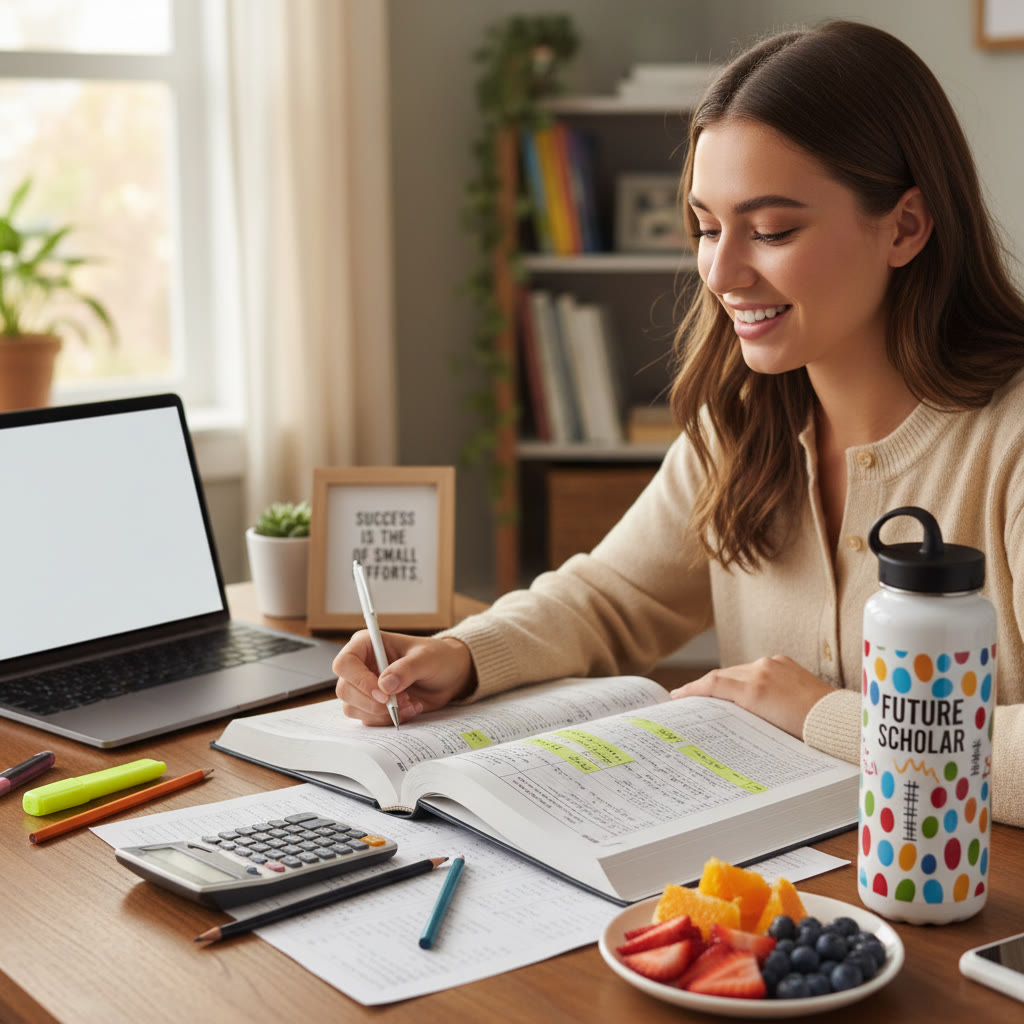
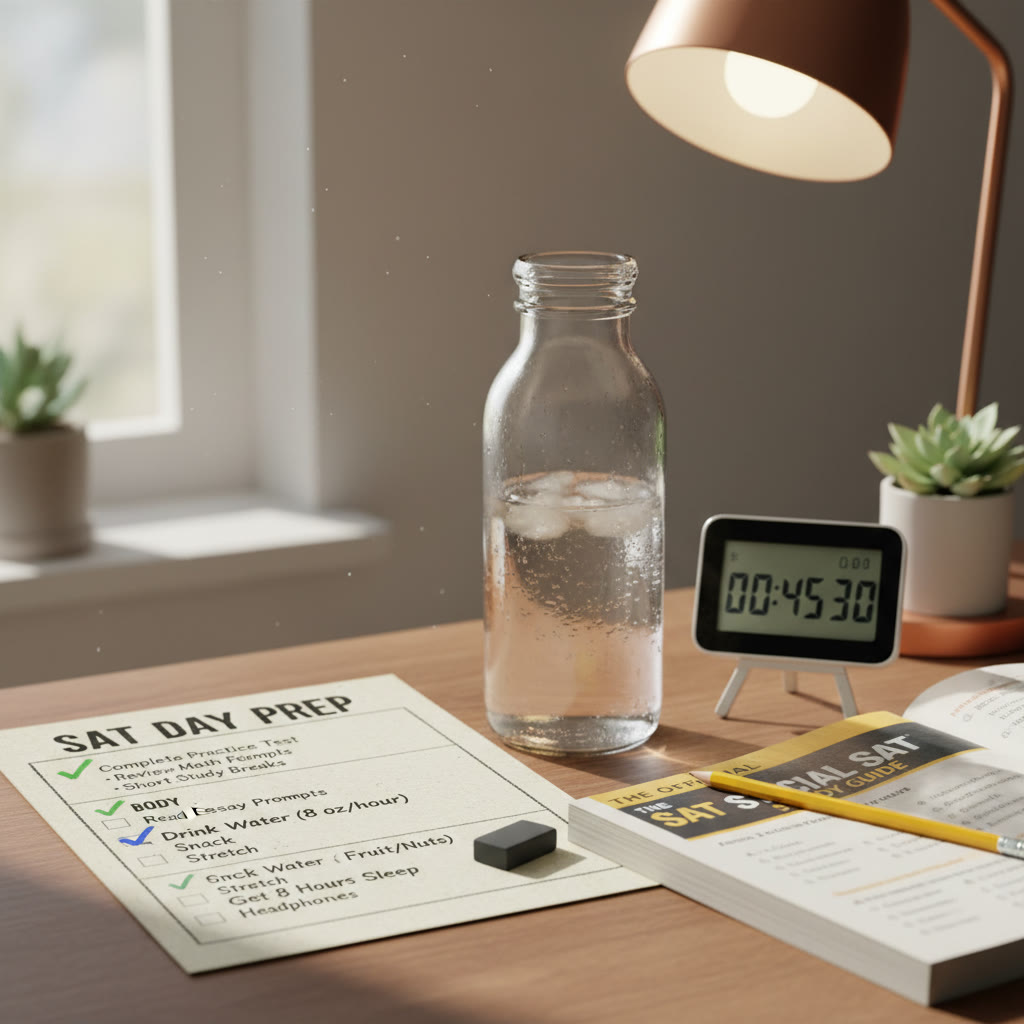





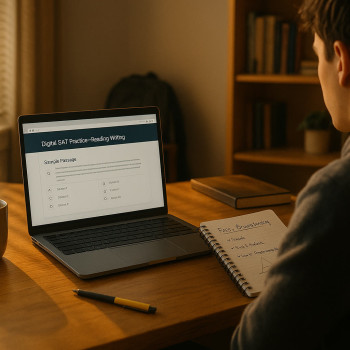
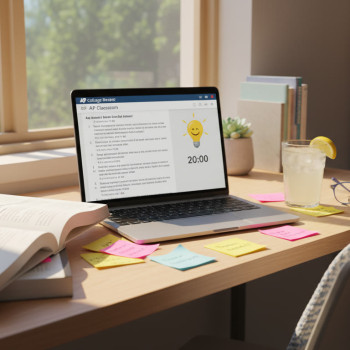
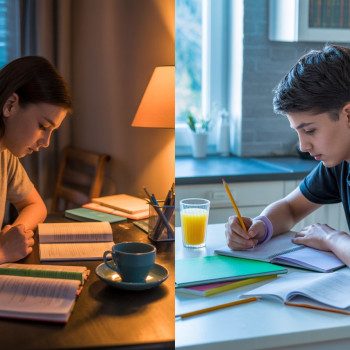








No Comments
Leave a comment Cancel